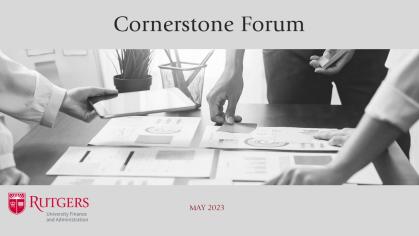Not Just Another Video Call: Adapting Training to Change Mindsets Amid COVID-19
In early 2020, the COVID-19 pandemic led to broad-scale changes in the Rutgers community’s personal and professional lives, affecting staff approaches to work, social interactions, and participation in recreational activities. As part of the Project Management Office (PMO) Training Team, Harnel Richmond witnessed the public health crisis’ impact on training and development, which shifted many—including Richmond and her PMO colleagues—from live, instructor-led sessions that fostered active engagement to video calls.
“As trainers, we didn’t have a choice but to adapt to this new way of teaching. We couldn’t forego training altogether and we couldn’t let participants sit through sessions frustrated, bound by the limits of their technological devices,” Richmond said.
Amid adversity, Richmond and her training team colleagues innovated. They specifically sought to increase the interactive and engaging nature of PMO’s online webinars, with the goal that participants would leave each session with the feeling that they truly got something valuable out of the meeting.
On March 16, 2021, Richmond and colleagues shared their techniques for doing just that at the RUONLINE Conference in a webinar titled “Adapting Training to Change Employee Mindsets During a Global Pandemic.”
“During this session, we had to persuade participants to buy into the theories that we shared about learning. It wasn’t just a matter of setting up a series of activities to engage with them on a video call,” Richmond reflected. “Granted, that was part of it, but none of it could work if we couldn’t actively involve participants by opening their minds and changing their mindsets about learning.”
The group shared information on the growth vs. fixed mindset concepts researched by Dr. Carol Dweck, as well as on psychological safety. When presenters create psychological safety, they create a space where people are not afraid to speak their minds, Richmond explained. To promote psychological safety during their presentation, Richmond and her team welcomed any and all questions in a non-judgmental manner, consistently maintained open-mindedness, and encouraged participants to take what might be perceived as a risk by earnestly expressing their thoughts about the ideas presented during the session.
Richmond and colleagues found that instilling psychological safety during the RUONLINE webinar enabled participants to share their thoughts more openly.
“We weren’t sure how many participants we would be engaging or how actively involved they would be going into the conference, but we found that they were not shy to share their feedback during our live session. It was great to have so much chatter and participation during the event!” Richmond said.
In addition to delineating theories on how to positively influence participant mindset in the digital meeting space, Richmond and colleagues shared other approaches that they found to be effective, including the use of polls, knowledge checks, real-life scenarios, and surveys. The presenters modeled examples of each approach to help viewers understand what each strategy looks like and how it works.
Like all departments within University Finance and Administration, PMO had to adapt its procedures during the unprecedented events of the COVID-19 pandemic. Given the volume of projects that involves the office, halting the essential and traditionally interactive training sessions relative to these projects wasn’t an option, so Richmond and her team took an inventive approach to keep the educational wheels turning.
“We have various training sessions on any given week due to the number of projects that the PMO is involved with, and none of them could have been stopped due to the fast pace of any given project,” Richmond explained. “We have been creative in our efforts and have banded together to make it all work. I thank my team, Kattlin Diaz, PMO Administrator, and Andrea Lacy Wilson, Senior Program Coordinator. It couldn’t have happened without them.


